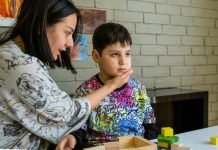
In a new study, researchers have identified mutations in a gene called CNOT1 that affect brain development and impair memory and learning.
The study is the first to link neurodevelopmental delays with CNOT1, suggesting that drugs that help restore the gene’s function may have therapeutic benefits.
It also revealed that CNOT1 interacts with several known autism genes. This discovery could help researchers better understand the genetic mechanisms underlying ASD.
The research was conducted by a team at Sanford Burnham Prebys Medical Discovery Institute and elsewhere.
The cause of developmental disabilities, including ASD, is poorly understood.
Research indicates that there may be a genetic component to these conditions, but the precise impact of the genetic variations that have been uncovered to date is unclear.
Identifying the underlying cause of developmental disabilities would allow scientists to create diagnostic tests that would provide early diagnoses and potential treatments.
In the study, the team identified a commonality between 39 people with a neurological disorder: variations in the CNOT1 gene.
These individuals, whose ages ranged from newborn to 22 years old, had symptoms that spanned from severe intellectual disability to nearly normal IQ and everyday functioning.
The researchers hoped to determine if the variations in the CNOT1 gene were benign or the cause of the neurological symptoms—the first step to finding potential treatments.
They identified nine CNOT1 variants that impaired learning and memory. All of these variants appeared spontaneously (de novo) in the patients, meaning they were not inherited.
The scientists also discovered that these CNOT1 mutations interact with known ASD genes—revealing a genetic link to ASD that can be further explored.
Next, the scientists plan to identify which molecular components interact with CNOT1, which functions as a scaffold that builds up a larger protein complex.
This work might uncover additional potential drug targets for intellectual, learning or memory disorders, including autism.
The team’s ultimate hope is to find a treatment that could be given as early as possible to help these children stay on track developmentally.
Surprisingly, the findings also have implications for heart disease.
A significant fraction of these patients also has cardiac defects. Conversely, children who are born with heart defects are at a higher risk of developing autism, too.
This study on CNOT1 also provides a previously unknown genetic link between heart function and autism.
One author of the study is Rolf Bodmer, Ph.D., the director and professor in the Development, Aging, and Regeneration Program at Sanford Burnham Prebys.
The study is published in The American Journal of Human Genetics.
Copyright © 2020 Knowridge Science Report. All rights reserved.



